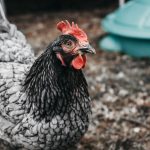Chickens have specific requirements for surviving cold weather, and understanding these needs is essential for maintaining their health and well-being during winter. Although chickens are generally hardy, they can be vulnerable to cold temperatures without proper shelter and protection. To maintain their body temperature in cold weather, chickens fluff up their feathers, creating an insulating layer of air.
They require constant access to fresh water to prevent dehydration, which can be particularly problematic in cold conditions. A balanced diet rich in protein and energy-dense foods is crucial for helping chickens stay warm and maintain their energy levels. Protection from wind, rain, and snow is vital for chickens during winter.
Exposure to harsh weather can cause stress and illness, so providing a sheltered environment is necessary. Chickens also need access to sunlight, which helps keep them warm and provides essential vitamins for their overall health. Understanding and addressing these specific cold weather needs is crucial for ensuring that chickens remain healthy, content, and productive throughout the winter months.
By providing appropriate care and attention, chicken owners can help their flocks thrive during colder seasons.
Table of Contents
- 1 Providing adequate shelter for chickens
- 2 Insulating the chicken coop
- 3 Using heat lamps or heaters
- 4 Providing warm bedding for chickens
- 5 Ensuring proper ventilation in the coop
- 6 Monitoring the chickens’ health and behavior in cold weather
- 7 FAQs
- 7.1 What are the best ways to keep chickens warm in cold weather?
- 7.2 What temperature is too cold for chickens?
- 7.3 How can I insulate my chicken coop to keep it warm?
- 7.4 Are there any specific breeds of chickens that are better suited for cold weather?
- 7.5 What should I feed my chickens to help keep them warm in cold weather?
Key Takeaways
- Chickens need extra care in cold weather to stay healthy and comfortable
- Adequate shelter is essential to protect chickens from harsh weather conditions
- Insulating the chicken coop helps maintain a warm and cozy environment
- Heat lamps or heaters can be used to provide additional warmth in the coop
- Warm bedding such as straw or wood shavings helps chickens stay warm and dry
Providing adequate shelter for chickens
Insulated and Draft-Free Coop
A well-built chicken coop is essential for protecting your flock from the elements and providing them with a safe and comfortable environment during the winter months. The coop should be insulated and draft-free, with proper ventilation to ensure good air quality. It should also be raised off the ground to prevent moisture from seeping in and causing dampness, which can lead to health issues for the chickens.
Spacious and Comfortable Accommodations
The coop should be spacious enough to accommodate the entire flock comfortably, with enough room for them to move around and roost without feeling cramped. Providing adequate shelter for your chickens is crucial for ensuring their well-being and productivity during the colder months.
Secure Outdoor Run
In addition to a well-built coop, it’s important to provide your chickens with a secure outdoor run where they can stretch their legs and get some fresh air, even in cold weather. The run should be protected from wind and precipitation, with a solid roof and walls to shield the chickens from the elements. It’s also a good idea to cover part of the run with clear plastic or a tarp to create a greenhouse effect, which can help to trap heat and provide a warmer environment for the chickens to enjoy.
By providing your flock with a secure and comfortable shelter, you can help them stay healthy and happy throughout the winter months.
Insulating the chicken coop

Insulating the chicken coop is an important step in preparing your flock for the challenges of cold weather. Proper insulation helps to regulate the temperature inside the coop, keeping it warm and comfortable for the chickens. There are several ways to insulate a chicken coop, including adding extra layers of insulation to the walls and ceiling, sealing any gaps or cracks where cold air could enter, and using materials such as straw or hay to create a cozy bedding for the chickens.
Insulation not only helps to keep the coop warm, but it also helps to prevent moisture buildup, which can lead to health issues for the chickens. By insulating the coop, you can create a comfortable and safe environment for your flock to thrive in during the winter months. Another important aspect of insulating the chicken coop is providing adequate bedding for the chickens.
Bedding materials such as straw, hay, or wood shavings help to create a warm and comfortable environment for the chickens to roost and nest in. These materials also provide insulation against the cold ground, helping to keep the chickens warm and dry. It’s important to regularly clean and replace the bedding to prevent moisture buildup and maintain good hygiene in the coop.
By insulating the coop and providing adequate bedding, you can help your flock stay warm and healthy throughout the winter months.
Using heat lamps or heaters
In extremely cold climates, it may be necessary to use heat lamps or heaters to provide additional warmth for your chickens. Heat lamps can be hung from the ceiling of the coop to provide a source of heat that helps to keep the chickens warm during particularly cold nights. It’s important to use heat lamps that are specifically designed for use in chicken coops, as they are designed to be safe and effective for this purpose.
Additionally, it’s crucial to position heat lamps carefully to prevent any fire hazards or injuries to the chickens. Heaters can also be used in larger coops or barns to provide consistent warmth for the flock. It’s important to choose heaters that are safe for use around animals and that are designed for use in agricultural settings.
By using heat lamps or heaters when necessary, you can help your chickens stay warm and comfortable during even the coldest winter nights. While heat lamps and heaters can be effective in providing additional warmth for your flock, it’s important not to rely on them as the sole source of heat in the coop. It’s crucial to ensure that the coop is properly insulated and draft-free before using heat lamps or heaters, as this will help to maximize their effectiveness and minimize energy costs.
Additionally, it’s important to monitor the temperature inside the coop regularly and adjust the heat lamps or heaters as needed to maintain a comfortable environment for the chickens. By using heat lamps or heaters responsibly, you can help your flock stay warm and healthy throughout the winter months.
Providing warm bedding for chickens
In addition to insulating the coop, providing warm bedding for your chickens is essential for helping them stay warm and comfortable during cold weather. Bedding materials such as straw, hay, or wood shavings help to create a cozy environment for the chickens to roost and nest in. These materials also provide insulation against the cold ground, helping to keep the chickens warm and dry.
It’s important to regularly clean and replace the bedding to prevent moisture buildup and maintain good hygiene in the coop. By providing warm bedding for your flock, you can help them stay comfortable and healthy throughout the winter months. Another way to provide warm bedding for your chickens is by using deep litter bedding in the coop.
Deep litter bedding involves adding layers of straw or other bedding materials to the floor of the coop throughout the winter months. As the chickens scratch and move around in the bedding, it breaks down and creates a natural composting process that generates heat. This helps to keep the coop warm and provides a natural source of warmth for the chickens.
Deep litter bedding also helps to control odors and moisture buildup in the coop, creating a healthier environment for your flock. By providing warm bedding for your chickens, you can help them stay cozy and content throughout the winter months.
Ensuring proper ventilation in the coop

Preventing Moisture Buildup and Health Issues
This can be achieved by installing vents or windows that can be opened and closed as needed to regulate airflow. It’s also important to regularly clean out any debris or waste from the coop that could contribute to poor air quality. By ensuring proper ventilation in the coop, you can help your flock stay healthy and comfortable throughout the winter months.
Controlling Odors and Harmful Gases
In addition to preventing moisture buildup, proper ventilation also helps to control odors in the coop and prevent the buildup of harmful gases such as ammonia. These gases can be harmful to both humans and animals if they are allowed to accumulate in an enclosed space. Proper ventilation helps to remove these gases from the coop and maintain good air quality for your flock.
Maintenance and Inspection
It’s important to regularly inspect and maintain ventilation systems in the coop to ensure that they are functioning properly throughout the winter months. By ensuring proper ventilation in the coop, you can create a healthy and comfortable environment for your chickens to thrive in during cold weather.
Monitoring the chickens’ health and behavior in cold weather
Finally, it’s important to monitor your chickens’ health and behavior closely during cold weather. Cold temperatures can have a significant impact on chickens’ well-being, so it’s crucial to keep an eye on them for any signs of distress or illness. Some common signs that indicate that your chickens may be struggling with cold weather include lethargy, decreased egg production, pale combs and wattles, shivering, or huddling together for warmth.
If you notice any of these signs, it’s important to take action immediately by providing additional warmth or seeking veterinary care if necessary. In addition to monitoring their physical health, it’s also important to pay attention to your chickens’ behavior during cold weather. Chickens are social animals that rely on each other for warmth and comfort, so it’s important to ensure that they have plenty of space to roost together and huddle for warmth when needed.
It’s also important to provide them with plenty of fresh water at all times, as dehydration can lead to health issues even in cold weather. By monitoring your chickens’ health and behavior closely during cold weather, you can ensure that they receive the care and attention they need to stay healthy and happy throughout the winter months. In conclusion, caring for chickens in cold weather requires careful attention to their specific needs and behaviors.
By understanding these needs and taking proactive measures such as providing adequate shelter, insulating the coop, using heat lamps or heaters when necessary, providing warm bedding, ensuring proper ventilation, and monitoring their health and behavior closely, you can help your flock stay healthy and productive throughout the winter months. With proper care and attention, your chickens can thrive even in cold weather conditions.
If you’re looking for more information on how to keep chickens warm, you might want to check out this article on how to insulate a chicken coop. It provides helpful tips and techniques for keeping your chickens cozy during the colder months.
FAQs
What are the best ways to keep chickens warm in cold weather?
Some of the best ways to keep chickens warm in cold weather include providing a well-insulated coop, using heat lamps or heated pads, and ensuring good ventilation while avoiding drafts.
What temperature is too cold for chickens?
Chickens can generally tolerate temperatures as low as 0°F (-18°C) as long as they have a dry and draft-free shelter. However, temperatures below freezing can still be dangerous for chickens, especially if they are wet or exposed to drafts.
How can I insulate my chicken coop to keep it warm?
You can insulate your chicken coop by using materials such as straw, hay, or wood shavings on the floor, adding extra bedding in nesting boxes, and sealing any drafts or gaps in the coop walls and windows.
Are there any specific breeds of chickens that are better suited for cold weather?
Yes, some chicken breeds are better suited for cold weather than others. Breeds such as the Rhode Island Red, Plymouth Rock, and Orpington are known for their cold-hardiness and ability to withstand colder temperatures.
What should I feed my chickens to help keep them warm in cold weather?
Feeding your chickens a balanced diet that includes high-energy foods such as grains and seeds can help keep them warm in cold weather. Additionally, providing access to fresh water and supplemental heat sources can also help maintain their body temperature.
Meet Walter, the feathered-friend fanatic of Florida! Nestled in the sunshine state, Walter struts through life with his feathered companions, clucking his way to happiness. With a coop that’s fancier than a five-star hotel, he’s the Don Juan of the chicken world. When he’s not teaching his hens to do the cha-cha, you’ll find him in a heated debate with his prized rooster, Sir Clucks-a-Lot. Walter’s poultry passion is no yolk; he’s the sunny-side-up guy you never knew you needed in your flock of friends!







